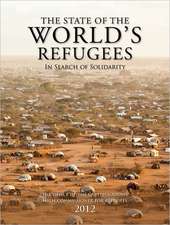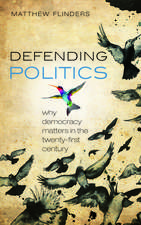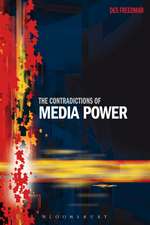Splitting the Middle: Political Alienation, Acquiescence, and Activism Among America's Middle Layers
Autor Cedric Herringen Limba Engleză Hardback – 30 noi 1989
This provocative new study explores the reasons for the dramatic decline in confidence which the political institutions of the U.S. have suffered since the 1960s. The author demonstrates the limitations of existing attempts to account for this heightened political alienation, particularly spirit of the times explanations which claim that events like the Vietnam War and Watergate affected the entire U.S. population in a similar fashion and political socialization and culture theories which, Herring argues, do not accurately gauge the amount of change that has occurred in the past 25 years. Instead, Herring proposes and tests a welfare split model which posits that conflicts over spending priorities of the state have led to spiraling alienation among different class fractions. Ideal as supplemental reading for advanced courses in political sociology, political economy, and political science, Splitting the Middle offers important new insights into the nature and causes of political alienation among America's middle layers.
After pointing out the polarizing effects of the movements and events since the 1960s, Herring shows that the increasing lack of confidence in political institutions has a class basis. The War on Poverty and the progressive movements of the 1960s and 1970s, he demonstrates, forced irreconcilable demands on government and produced dual tendencies among different classes. On the one hand, levels of political alienation swelled among members of the capitalist, professional-managerial, and traditional working classes as a reaction to protest movement activities, growing deficits and the increasing burdens of the welfare state. At the same time, Herring asserts, political distrust among the new layer of public sector professionals and the poor grew because of cutbacks in government programs and worsening economic conditions. Using data from the "National Elections Studies" and other sources, Herring shows how the government's oscillation between mutually contradictory sets of demands led to higher levels of political distrust. Finally, Herring analyzes what consequences these higher levels of alienation have had on political behaviors and the society.
Preț: 344.90 lei
Preț vechi: 475.82 lei
-28% Nou
65.100€ • 70.57$ • 55.03£
Carte tipărită la comandă
Livrare economică 17 aprilie-01 mai
Specificații
ISBN-10: 0275933210
Pagini: 159
Dimensiuni: 156 x 234 x 11 mm
Greutate: 0.4 kg
Ediția:New.
Editura: Praeger
Descriere
After pointing out the polarizing effects of the movements and events since the 1960s, Herring shows that the increasing lack of confidence in political institutions has a class basis. The War on Poverty and the progressive movements of the 1960s and 1970s, he demonstrates, forced irreconcilable demands on government and produced dual tendencies among different classes. On the one hand, levels of political alienation swelled among members of the capitalist, professional-managerial, and traditional working classes as a reaction to protest movement activities, growing deficits and the increasing burdens of the welfare state. At the same time, Herring asserts, political distrust among the new layer of public sector professionals and the poor grew because of cutbacks in government programs and worsening economic conditions. Using data from the National Elections StudieS≪/i> and other sources, Herring shows how the government's oscillation between mutually contradictory sets of demands led to higher levels of political distrust. Finally, Herring analyzes what consequences these higher levels of alienation have had on political behaviors and the society.
Notă biografică
CEDRIC HERRING is in the Department of Sociology at the University of Illinois, Chicago. He has been a Ford Foundation Fellow at the University of Texas at Austin and a Visiting Assistant Professor at Indiana University in Bloomington. He is the author of numerous articles in publications such as Sociological Quarterly, Political Psychology, and Annual Review of Political Science.












